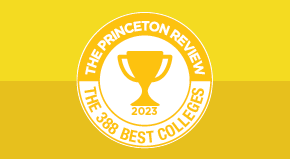Presented by DigiPen Institute of Technology
How do I become a game designer?
You know you could design video games. After all, you were practically born with a controller in hand. Nevertheless, you’re unsure of how to turn this dream into a reality. Fortunately for you, DigiPen - one of the country’s leading game design programs - is offering up some fantastic insight to aspiring designers.
Q: What advice do you have for a student who is interested in becoming a game designer as a career path and major? What are some extracurricular activities or additional skills that are important to develop?
A: It’s always important to have outside interests, not only to inform your professional work but also to give you an outlet for growth and fulfillment outside of work. It’s important to be able to work with a wide variety of professionals and understand their perspectives, so anything you can do to gain collaborative experience — whether in sports or music or something else — is great. Also, creative people create. If you want to make games, don’t just think about it. Start making games! Try new ideas and share them with others. Never stop thinking, creating, and growing.
Q: What does it take to be successful in the DigiPen game designer program?
A: Successful students certainly need to be hardworking and dedicated to their education and willing to develop their time-management skills. Successful students also must work well with other people, including their peers from other majors. Every year, the most successful student game teams — and the ones who have the best overall experience — are often the teams that focus not only on creativity but on communication and project management. It’s not that students need to have those skills at the beginning of the program, but they have to be ready to build them because professional game development is rarely a solo endeavor.
Q: What are you most proud of with respect to the DigiPen game designer program?
A: Our game design and development programs are focused on the intersection of passion, innovation, creativity, and technology. We have two distinguishing features. The first has students applying classroom knowledge to create their own systems, tools, and game engines—not just using the software tools currently being used by the industry. The second has students working across interdisciplinary project teams to create a game or animation every year. Thanks to our project-based coursework, graduating students will also have worked on multiple game projects from inception to completion in a professional studio-like environment. Students are responsible for overseeing and managing resources, time, budget, personnel and the product itself during the entire production lifecycle.
Q: What does a game design student accomplish after four years in the program? Will they have created their own games?
A: Game design students will absolutely create a game. One of the hallmarks of a DigiPen education is our cross-disciplinary, collaborative team structure. Project classes are required every semester and are organized to simulate a real-world team studio environment. The project classes are effectively a large game publisher, with each student team being an independent studio. The instructors are the executive producers who help guide each team and set the requirements they must meet. To make the experience as realistic as possible, the teams consist of software engineers, game designers, sound designers, artists, and more all working together to create a game.
Q: Do you have any success stories to share with regard to recent graduates? What kind of game design jobs have they landed?
A: Yes! We have alumni all over the world who have worked on some of the most successful games of the past few years, from Fortnite to Minecraft to Red Dead Redemption II (and many more). In each of those three examples, there are multiple DigiPen alumni working together as professional coworkers. At the same time, we’re excited to see our graduates taking their game design experience into new fields altogether. We recently spoke with a graduate who is the lead app developer for the NFL and another graduate making games for AI at Seattle’s Allen Institute for Artificial Intelligence.
Pumped up by the prospect of studying game design? Learn more about DigiPen and other top programs here .
Read More
Explore Colleges For You
Connect with our featured colleges to find schools that both match your interests and are looking for students like you.
Get Started on Athletic Scholarships & Recruiting!
Join athletes who were discovered, recruited & often received scholarships after connecting with NCSA's 42,000 strong network of coaches.
Best 388 Colleges
154,000 students rate everything from their professors to their campus social scene.



